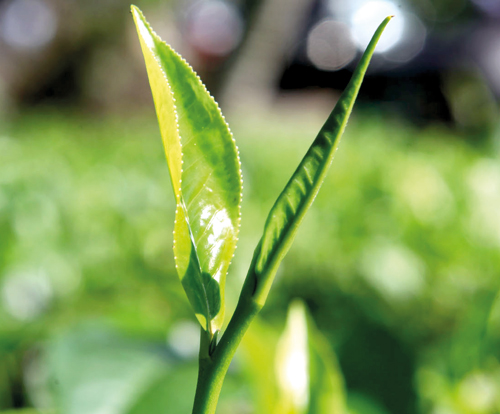Ceylon Tea on the brink of losing global appeal
 Ceylon Tea synonymous with quality and uniqueness of its origins could lose its place in the global market as smallholder growers who contribute 70 per cent of production face a crisis due to the new fertiliaer policy.
Ceylon Tea synonymous with quality and uniqueness of its origins could lose its place in the global market as smallholder growers who contribute 70 per cent of production face a crisis due to the new fertiliaer policy.
Ceylon Tea will be just a name in the history books since within the next three months there will be a yield and quality drop on the estates of the smallholder growers, Tea Smallholders Association President Kehel Gunaratna told the Business Times adding that within one and a half years’ time the crop will be lost and so too their incomes.
He noted “even now we are facing a crisis” because since May growers have not received the stocks of fertiliser needed to carry out the application.
Organic fertiliser is thought to be good but it will take at least five years for it to be completely adapted by the plant, he explained adding that this should have been carried out in a phased out manner to ensure that the plants adapt to the changed fertiliser gradually.
Mr. Gunaratna pointed out that when they requested the Tea Smallholder Development Authority (TSHDA) to state what fertiliser then could be used they remained silent on the issue.
He noted that at a time like this the officials should ensure that the government is correctly informed of the consequences of using organic fertiliser in the said manner and must be able to explain the adverse situation faced by the growers as a result of such sudden application of this type of fertiliser.
Mr. Gunaratna explained that he was not aware of any country shifting completely to organic fertiliser for the cultivation of tea.
The TSHDA had already written and made online representations to the Plantation Ministry Secretary and Minister but to no avail.
Without the adequate fertiliser for the tea crop the plant will lose their nutritional value and the leaf would become yellow.
Growers have not received fertiliser since May and no stocks have been distributed either, he said.
Usually the nutritional value lost is regained from the chemical fertiliser application and when this does not happen then the leaf will turn yellow and this leaf then cannot be sent to the factory.
With 600,000 livelihoods dependent on the cultivation of tea in their home gardens or small estates their incomes will dwindle as a result of lower yields and drop in quality, Mr. Gunaratna explained.
The larger Regional Plantation Companies (RPCs) however have sufficient stocks for this season but when this runs out they believe the plants will die a natural death within about one and a half years’ time.
As a result the industry will face the same issues they encountered in 2019 due to the lack of glyphosate, a popular weedicide used on the estates.
“If you don’t produce quality teas then other countries will not wait until we put our house in order,” Planters Association spokesman Dr. Roshan Rajadurai told the Business Times on Thursday.
He pointed out that while they have sufficient stocks for this time around they will not have enough for the next season.
The government has asked for details of the crops harvested and it is believed that there is some fertiliser stocks still available with the government that will be given out, it was noted.
Dr. Rajadurai pointed out that they have continued to make representations to the relevant authorities but to no avail.
Ever since the glyphosate fiasco Sri Lanka lost its Japanese market to which it nows export teas in small quantities.
“Based on our experience in cultivating tea this method will lead to the collapse of the industry as there is a certain protocol to follow,” he said.
Tea growers form only 5 per cent of the total agricultural population in the country but still they generate a sizable revenue annually.


